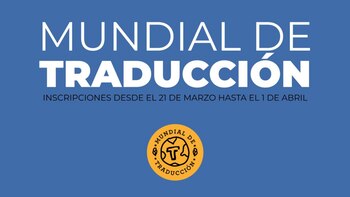
After six editions of the World Writing World Cup that brought together some 50,000 contestants from all over the world, the organizers of the playful proposal that emerged at the beginning of the pandemic decided to launch the World Translation Championship, an initiative aimed at enabling children, adolescents and adults to lend themselves to the exercise of migrating the texts of a language to another. Translating is an act of intimate reading, and it is also a creative act; it is an activity that combines reading and writing. Based on this premise, the poet and publisher Santiago Llach, the principal architect of the World of Writing, decided to redirect his original creation with the idea that all people interested in literature, even those who do not know a foreign language, risk translating a text and playing with it to produce a version or cover totally free.
“After two years of carrying out the project, we found it interesting to innovate. To translate is to bring, to transfer, to take from here to there. All writing is actually translation: from the inner world to that of words, from experience to the page; all writing includes the appropriation of what has already been written. To translate is to surrender to the ecstasy of influences,” explains Llach. The proposal of the Translation World Cup is simple: for this time there will be no teams, but those interested will have to register and choose a single poem from the corpus selected by the organization, among which they will have to choose one to translate or revert. Participants will have one week to complete the exercise.
The poem chosen may be in their own language, in a language they know or in one they do not know. The organizers say that they are not looking for faithful translations but that participants make a free version of the poem of their choice: they can reinterpret a poem in classical Spanish or even deduce the meaning of words by their shapes or sounds and write using that as a trigger. At the end of the week of writing (or translation), participants must submit their version of the chosen poem through a form, along with an accompanying 500-character text, reflecting on the translation experience or telling something related to that experience or the translated text. All poems and texts will go through two instances of juries, which will define who are the winners of each of the categories.
Instead of translating, children must write a short story, up to 1,500 characters, based on children's songs or poems. Within the framework of the Translation World Cup, there will also be open and free workshops for children, adolescents and adults to exercise the slogan of this new edition, which will be conducted by Marina Mariasch, Santiago Llach, Olivia Gallo and Adriana Fernández. The cycle of interviews that will begin with the poet and translator Ezequiel Zaidenwerg will also continue.
On the subject of the proposal, several translators shared their vision about translation. For Marcelo Zabaloy (Ulysses translator), “translating is an excellent reading and writing workshop”. Jorge Aulicino (translator of La Divina Comedia) indicated that “translation is a poetic exercise. It's about transferring the world, the artifice, of an author not only into my own language, but into my own world.” For his part, Edgardo Scott (translator for Dubliners) said that “translation is an act of reading, I think you can never read a text as intensely as when you translate it”. Those interested in participating can register here between March 21 and April 1.
Source: Telam S.E.
KEEP READING
Últimas Noticias
Debanhi Escobar: they secured the motel where she was found lifeless in a cistern
Members of the Specialized Prosecutor's Office in Nuevo León secured the Nueva Castilla Motel as part of the investigations into the case

The oldest person in the world died at the age of 119
Kane Tanaka lived in Japan. She was born six months earlier than George Orwell, the same year that the Wright brothers first flew, and Marie Curie became the first woman to win a Nobel Prize

Macabre find in CDMX: they left a body bagged and tied in a taxi
The body was left in the back seats of the car. It was covered with black bags and tied with industrial tape
The eagles of America will face Manchester City in a duel of legends. Here are the details
The top Mexican football champion will play a match with Pep Guardiola's squad in the Lone Star Cup

Why is it good to bring dogs out to know the world when they are puppies
A so-called protection against the spread of diseases threatens the integral development of dogs



